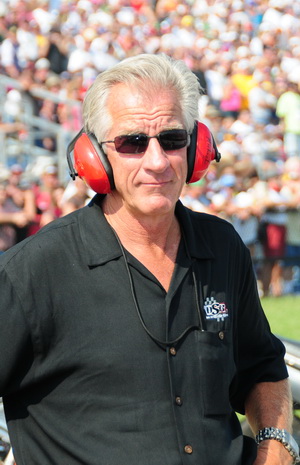DRAG RACING AND DRUG TESTING - FROM THE MANAGEMENT ANGLE
Tue, 2009-09-01 10:26
Before Mike Lewis stepped into his role as Senior Vice President at Don Schumacher Racing, he served a stint as a Vice President of NHRA.  Lewis was there when the NHRA enacted their policy.
Lewis was there when the NHRA enacted their policy.
From where he stands, the sport doesn't just look clean, it is clean.
“I think it is,” replied Lewis, the question of is the NHRA clean on the table. “I worked for NHRA as a vice-president when the drug policy was put into effect. And I wasn't directly responsible for the implementation of the policy, but I was responsible for being part of the competition committee when that policy was put into effect. So I understand what they've done, why they've done it, and I think they've done it as well as any other motor sports organization. And I would say that we have a much better record than certain other sports.”
Certainly better than NASCAR, which has suspended several crew members in all three of it's top divisions and one driver – Jeremy Mayfield – this year alone. When it comes to the NHRA and it's drug policy, the NASCAR policy is always the one mention when it comes to comparisons. In fact, there are many differences for a variety of reason, all very reasonable when explained.
There really is no reason to compare the NHRA policy to those of football, baseball, basketball, hockey, soccer and other professional sports. Even the amateur sports such as swimming and cycling are such different animals, there is no reason to compare them to the NHRA.
Drag racing is unique. Performance enhancing drugs have very little value in a 4 second battle down a 1000foot, or 1320 foot, strip of concrete or asphalt. The bigger concern is the illegal use of “recreational drugs”, the abuse of prescription drugs and the abuse of alcohol. Those are the primary concerns of the NHRA, as seen by those that make up the show.
“I think NHRA has done a great job in identifying or ruling out from competition any one that's relying on drugs or alcohol and they have some in their system,” said Lewis. “They've done a good job of maintaining confidence.”
Confidence to a race car driving is everything. They must have confidence in themselves, the machine they drive and the driver in the lane next to them.
What is also needed is fairness and compassion. The stewards of the sport don't want drugs involved in the sport, but they understand the human element involved. It is not the intention of the rule book to punish an individual with the harshest possible penalty on a first offense. In fact, a driver could test positive for a banned substance, go through rehab and the NHRA offices would never be the wiser. Get caught a second time and no one can save you from being removed from the sport, permanently.
Why the initial leniency?
“There are legal issues dealing with personal privacy,” said Lewis. “There are legal issues dealing with somebody's career and advancement of their career and so forth. There were some notable exceptions that were very public, you know the Darrel Alderman case was very public, and that was not based on personal use of a product, but of distribution of product and admission to a felony. Different story.
“But, I think that privacy is a key part of all of this, and I think the focus is on two things, one is making sure that we don't subject fans, other drivers and so forth, to individuals in control of dangerous equipment who are not of sound presence of mind. That's number one. And two is identifying at an early stage anything, minor infractions, single use infractions, hangovers...things like that can show up in these drug tests. (You) give the individual a chance to clean themselves, learn from the experience.”
 Lewis was there when the NHRA enacted their policy.
Lewis was there when the NHRA enacted their policy.From where he stands, the sport doesn't just look clean, it is clean.
“I think it is,” replied Lewis, the question of is the NHRA clean on the table. “I worked for NHRA as a vice-president when the drug policy was put into effect. And I wasn't directly responsible for the implementation of the policy, but I was responsible for being part of the competition committee when that policy was put into effect. So I understand what they've done, why they've done it, and I think they've done it as well as any other motor sports organization. And I would say that we have a much better record than certain other sports.”
Certainly better than NASCAR, which has suspended several crew members in all three of it's top divisions and one driver – Jeremy Mayfield – this year alone. When it comes to the NHRA and it's drug policy, the NASCAR policy is always the one mention when it comes to comparisons. In fact, there are many differences for a variety of reason, all very reasonable when explained.
There really is no reason to compare the NHRA policy to those of football, baseball, basketball, hockey, soccer and other professional sports. Even the amateur sports such as swimming and cycling are such different animals, there is no reason to compare them to the NHRA.
Drag racing is unique. Performance enhancing drugs have very little value in a 4 second battle down a 1000foot, or 1320 foot, strip of concrete or asphalt. The bigger concern is the illegal use of “recreational drugs”, the abuse of prescription drugs and the abuse of alcohol. Those are the primary concerns of the NHRA, as seen by those that make up the show.
“I think NHRA has done a great job in identifying or ruling out from competition any one that's relying on drugs or alcohol and they have some in their system,” said Lewis. “They've done a good job of maintaining confidence.”
Confidence to a race car driving is everything. They must have confidence in themselves, the machine they drive and the driver in the lane next to them.
What is also needed is fairness and compassion. The stewards of the sport don't want drugs involved in the sport, but they understand the human element involved. It is not the intention of the rule book to punish an individual with the harshest possible penalty on a first offense. In fact, a driver could test positive for a banned substance, go through rehab and the NHRA offices would never be the wiser. Get caught a second time and no one can save you from being removed from the sport, permanently.
Why the initial leniency?
“There are legal issues dealing with personal privacy,” said Lewis. “There are legal issues dealing with somebody's career and advancement of their career and so forth. There were some notable exceptions that were very public, you know the Darrel Alderman case was very public, and that was not based on personal use of a product, but of distribution of product and admission to a felony. Different story.
“But, I think that privacy is a key part of all of this, and I think the focus is on two things, one is making sure that we don't subject fans, other drivers and so forth, to individuals in control of dangerous equipment who are not of sound presence of mind. That's number one. And two is identifying at an early stage anything, minor infractions, single use infractions, hangovers...things like that can show up in these drug tests. (You) give the individual a chance to clean themselves, learn from the experience.”
Categories:


